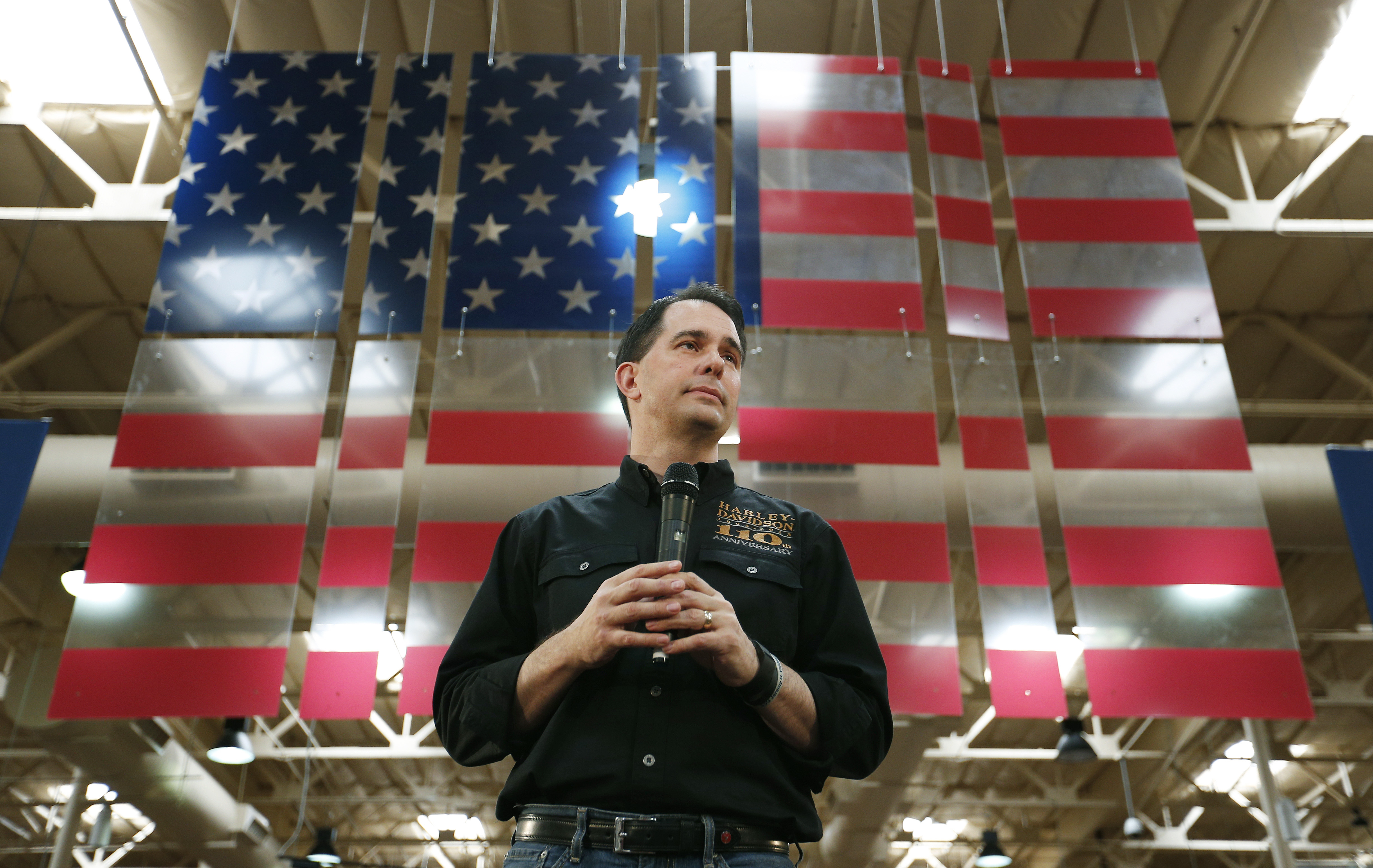Scott Walker just made a smart move on health care
For too long, Republicans have focused on only the first part of "repeal and replace." That might be changing.


Scott Walker, one of the top contenders for the Republican presidential nomination, has been a bit of a Rorschach test. The case for his candidacy mostly rests on his record as governor of Wisconsin, especially the part where he faced down public sector unions. While that shows conservative bona-fides, political smarts, and a backbone — certainly all important qualities in a presidential contender — it doesn't really tell us much about the policies Walker would bring to the presidency.
For a while, Walker has been coasting on this uncertainty, trying to be all things to all people. To his credit, he's been honest about the fact that, as a governor, he hasn't studied federal issues in nearly the depth that he needs to. Now, however, it looks like he's ready to take the test — at least on health care reform.
On Tuesday, Walker debuted his plan to actually repeal and — here's the important part — "replace" ObamaCare. This is noteworthy because Republicans have spent way too long talking about the need to replace it without rolling out an alternative plan on their own. For a long time, this was smart politics — you can only motivate a big coalition for a large-scale political fight by uniting around a single "ask." Plus, opposing a policy that you genuinely think is bad is not necessarily a terrible thing. If you thought the Iraq War was wrong, you shouldn't have to have a plan to magically fix the Middle East to get heard.
The Week
Escape your echo chamber. Get the facts behind the news, plus analysis from multiple perspectives.

Sign up for The Week's Free Newsletters
From our morning news briefing to a weekly Good News Newsletter, get the best of The Week delivered directly to your inbox.
From our morning news briefing to a weekly Good News Newsletter, get the best of The Week delivered directly to your inbox.
But the time for "repeal and repeal" is long gone. Now that Obama has won reelection, the way to repeal and replace is to get a Republican president and Congress. More importantly, a Republican Party that wants to govern should actually know what it wants to do with the health care system in America. And critically, it's no longer smart politics to be hush-hush about it: Any Republican president is going to have to sell the American people on a genuine vision of where to take the health care system. The reason why Americans reelected Barack Obama even though they didn't like ObamaCare was because they felt — maybe justifiably — that even though they didn't like ObamaCare, they couldn't trust Romney to replace it with anything but, "You're on your own."
And one reason why the Republican Party has been unable to coalesce around an alternative vision to ObamaCare is because there is genuine disagreement among conservatives on where to proceed. In particular, should conservatives try to mimic ObamaCare's goal of expanding coverage, even if it entails spending a little more money? Or should they view increased coverage as essentially irrelevant, focusing instead on expanding access through health care reforms that would increase competition and thus, hopefully, reduce costs?
There is an important argument to make about the merits of the latter case: Looking too myopically at coverage makes coverage, rather than health itself, the goal. For example, Medicaid recipients have "coverage" but don't have better health outcomes than the uninsured.
But here's the thing. First, on the merits, there is nothing wrong, and everything laudable, with the idea that a country as fantastically wealthy as the United States should aim to give every citizen some sort of safety net when it comes to health care.
A free daily email with the biggest news stories of the day – and the best features from TheWeek.com
But conservatives should pay attention to a more pragmatic point: Any reform that doesn't match ObamaCare's coverage numbers is a surefire political loser. And the reason for this is that the GOP's single biggest political problem is that it is perceived as the party of the rich, something which a myopic focus on top-income tax rates and crony capitalism (as well as one Willard Mitt Romney) did little to alleviate. A health care reform that says to current ObamaCare recipients, "You know, figure it out," is the best way to turn off the independent voters that the GOP needs.
Which is why it's a particularly good sign that Walker has opted for a version of the plan proposed by conservative reformers, such as James Capretta, that offers a refundable tax credit to buy health insurance. The key thing is that the credit is refundable, meaning low-income Americans who max out their tax liability with the credit get a check from the government to buy health insurance. This means that everyone can buy it. Walker's plan also offers a tax credit for getting a health savings account, probably the single most important thing we can do to get progress in the American health care system. The plan also proposes to reform Medicaid, something that is badly needed because it ill-serves the poor.
This is the right approach on the merits: By allowing people to buy the health care plan they want, and to control more of their spending, it will increase competition in the health care system and therefore spur innovation and reduce costs. Equally important, it will ensure almost all Americans are covered.
It's also the right approach politically, and a very good sign for American politics writ large. That Scott Walker, aka Mr. Median Republican, is adopting reform conservative ideas shows these ideas are winning. Three cheers for that!
Pascal-Emmanuel Gobry is a writer and fellow at the Ethics and Public Policy Center. His writing has appeared at Forbes, The Atlantic, First Things, Commentary Magazine, The Daily Beast, The Federalist, Quartz, and other places. He lives in Paris with his beloved wife and daughter.
-
 ‘The economics of WhatsApp have been mysterious for years’
‘The economics of WhatsApp have been mysterious for years’Instant Opinion Opinion, comment and editorials of the day
-
 Will Democrats impeach Kristi Noem?
Will Democrats impeach Kristi Noem?Today’s Big Question Centrists, lefty activists also debate abolishing ICE
-
 Is a social media ban for teens the answer?
Is a social media ban for teens the answer?Talking Point Australia is leading the charge in banning social media for people under 16 — but there is lingering doubt as to the efficacy of such laws
-
 The billionaires’ wealth tax: a catastrophe for California?
The billionaires’ wealth tax: a catastrophe for California?Talking Point Peter Thiel and Larry Page preparing to change state residency
-
 Bari Weiss’ ‘60 Minutes’ scandal is about more than one report
Bari Weiss’ ‘60 Minutes’ scandal is about more than one reportIN THE SPOTLIGHT By blocking an approved segment on a controversial prison holding US deportees in El Salvador, the editor-in-chief of CBS News has become the main story
-
 Has Zohran Mamdani shown the Democrats how to win again?
Has Zohran Mamdani shown the Democrats how to win again?Today’s Big Question New York City mayoral election touted as victory for left-wing populists but moderate centrist wins elsewhere present more complex path for Democratic Party
-
 Millions turn out for anti-Trump ‘No Kings’ rallies
Millions turn out for anti-Trump ‘No Kings’ ralliesSpeed Read An estimated 7 million people participated, 2 million more than at the first ‘No Kings’ protest in June
-
 Ghislaine Maxwell: angling for a Trump pardon
Ghislaine Maxwell: angling for a Trump pardonTalking Point Convicted sex trafficker's testimony could shed new light on president's links to Jeffrey Epstein
-
 The last words and final moments of 40 presidents
The last words and final moments of 40 presidentsThe Explainer Some are eloquent quotes worthy of the holders of the highest office in the nation, and others... aren't
-
 The JFK files: the truth at last?
The JFK files: the truth at last?In The Spotlight More than 64,000 previously classified documents relating the 1963 assassination of John F. Kennedy have been released by the Trump administration
-
 'Seriously, not literally': how should the world take Donald Trump?
'Seriously, not literally': how should the world take Donald Trump?Today's big question White House rhetoric and reality look likely to become increasingly blurred
